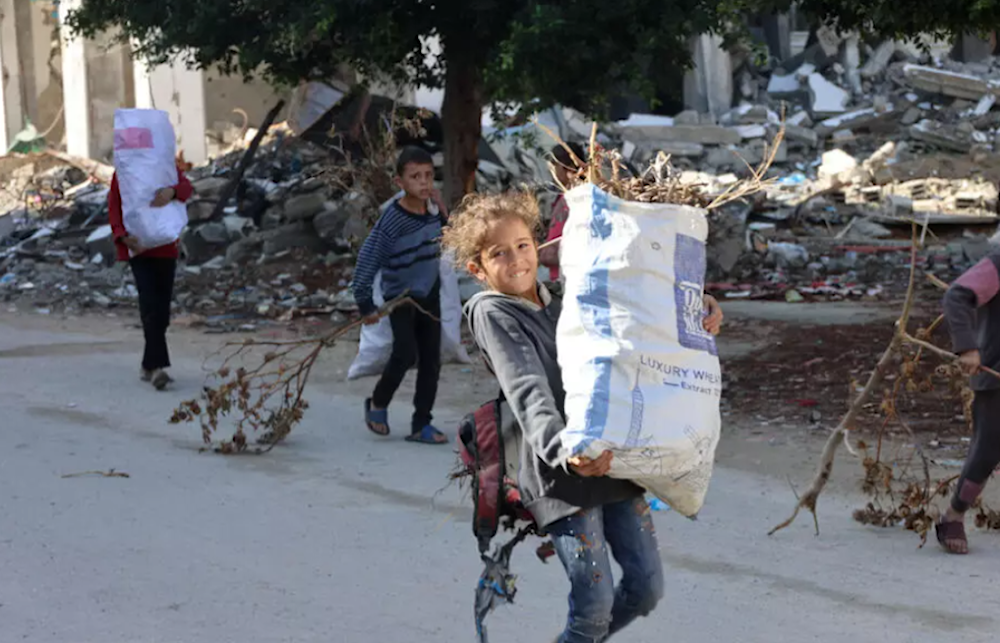WHO warns of 'critical shortages' in northern Gaza
WHO Chief Tedros Adhanom Ghebreyesus says a majority of Palestinians are living in tents with a severe shortage of medicine and fuel.
-

Palestinian children carry firewood to their homes in Jabalia on November 20, 2024. (AFP)
The World Health Organization warned Thursday of severe shortages of medications, food, housing, and fuel in Gaza, particularly in the north, urging the Israeli occupation to allow more aid into the strip.
The WHO described the situation on the ground as "catastrophic", with chief Tedros Adhanom Ghebreyesus describing how at the start of the war, virtually all of those displaced by the violence sought refuge in public institutions or with family members, whereas now "90% are living in tents."
At a news briefing at the WHO headquarters in Geneva, he described how Palestinians are left vulnerable to "respiratory and other diseases, (while) cold weather, rain, and flooding are expected to exacerbate food insecurity and malnutrition."
This week, the WHO and its partners conducted a three-day journey to the north, visiting over a dozen health institutions, where the UN predicted an imminent famine.
The WHO's head stated that the team had observed a "high number of trauma patients and an increasing number of patients with chronic diseases needing treatment as well as a severe shortage of medicine.
He insisted the WHO is "doing everything we can -- everything Israel allows us to do -- to deliver health services and supplies."
Only 9 aid missions approved out of 22
Rik Peeperkorn, the WHO representative in the Palestinian territories revealed to journalists that out of 22 missions planned to the north in November only 9 had been approved.
He expressed hope that a planned trip to the last two surviving "minimal" operating hospitals in the north, Kamal Adwan and Al Awda, would go as planned on Saturday, emphasizing they are "in need of everything," and specifically mentioning the dire need for fuel. "Without fuel, there are no humanitarian operations at all, Peeperkorn noted.
Peeperkorn did report that the WHO assisted in the medical evacuation of 17 Gaza patients to Jordan this week, with 12 of them proceeding to the United States for treatment.
They were among approximately 300 patients allowed to escape since "Israel" closed Gaza's main Rafah border crossing in early May, according to Peeperkorn, who added that 12,000 remained in Gaza awaiting evacuation.
He warned, "If we continue at this pace, we will be busy for the next 10 years."
UN says 'Israel' blocked all Nov. life-saving aid bids in north Gaza
The United Nations reported on Tuesday that the Israeli occupation had obstructed all UN efforts to deliver life-saving assistance to Palestinians in the northern Gaza Strip throughout November.
"None of the UN's 41 attempts to reach Palestinians in besieged areas of North Gaza with life-saving assistance this month has been facilitated by Israeli authorities," stated UN deputy spokesman Farhan Haq during a news conference.
Haq revealed that Israeli authorities denied 37 missions outright, while four were approved but then were impeded on the ground, achieving only partial success. With winter approaching, thousands of forcibly displaced Palestinians face worsening conditions, including health risks from sewage build-up in overcrowded areas.
Heavy rains have inundated displacement tents across the Gaza Strip, compounding the already dire conditions for Palestinians as Israeli attacks intensify.
The Palestinian Civil Defense warned on Monday that the arrival of winter is ushering in "a real humanitarian catastrophe." Thousands of forcibly displaced individuals have been severely impacted by flooding, prompting urgent calls for global intervention to deliver humanitarian aid to the struggling population.
The Gaza Government Media Office reported that "nearly 10,000 tents were swept away by seawater and damaged over the past two days." It warned that the onset of winter and worsening storm conditions threaten the lives of "hundreds of thousands of displaced people in the Gaza Strip."
In a statement, the office called for urgent humanitarian aid, saying, "We urgently repeat our call for immediate humanitarian aid to save hundreds of thousands of displaced people in the Gaza Strip before it's too late."

 4 Min Read
4 Min Read








